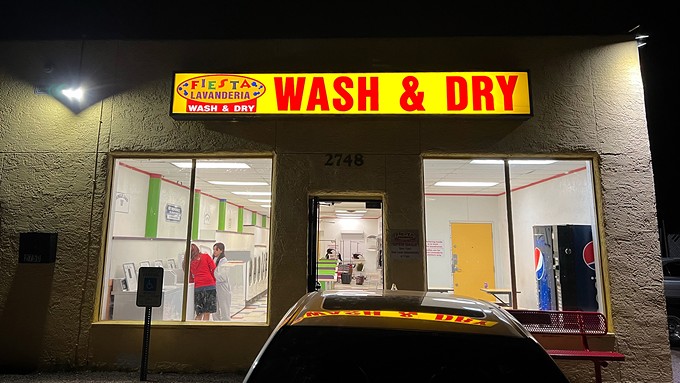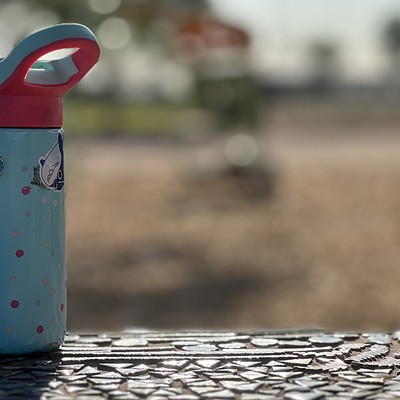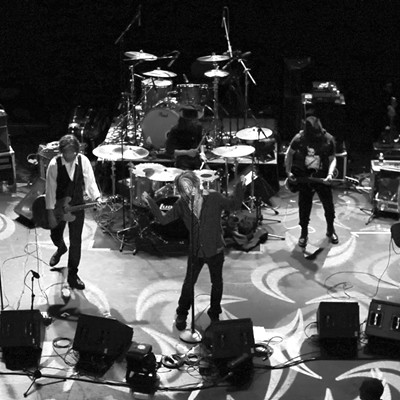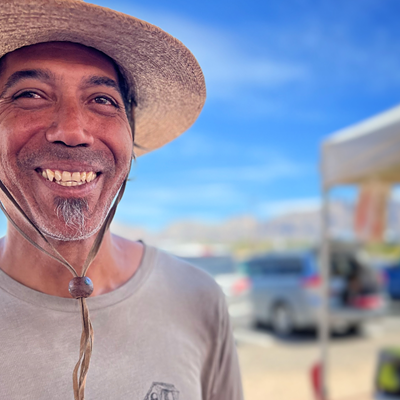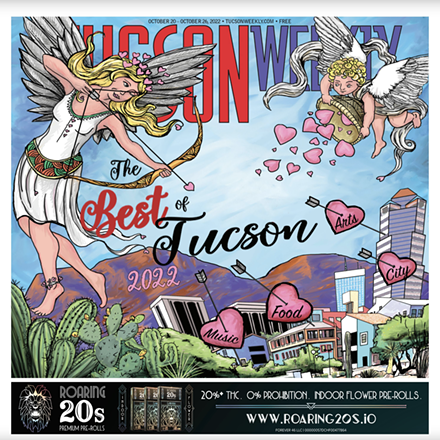White dude enters a black barbershop in Tucson. The five middle-aged gents inside begin calling me Peter Parker, and it is droll and amiable. A “Spider-Man” discourse ensues and the comedy soars.
DC’s, as it’s called, shares walls of a white-owned gun store on the northside and a Mexican-owned beauty salon to the south, on a side street off Speedway in central Tucson. The trio of businesses show a façade with minimal signage, perhaps last updated decades ago, a dusty but fetching little row behind a filling station that’s been there decades. Mom and pops you could say, the best of what capitalism could do for the working class, now vanishing off the face of the earth.
The look inside the rectangular joint feels ensconced into brick and stone, there’s mini bleacher seating just inside the window, which could seat maybe 12. The loose configuration of barber accoutrement — clippers, brushes, cleaners, disinfectants, sanitizers, trimmers and razors, four barber chairs, and so on. Sports memorabilia on the wall, even old Playboy Magazines for leafing. Man, this is my dad and granddad’s scene. It is a close cousin to the murky old-man bar, comfy as a rec room.
I watch the two cutters, one is the owner. They’ve a pal killing time on the bleachers and there are two customers getting their heads worked on. The cutters are masters with clippers and trimmers. When you watch someone this skilled—after decades of experience became part of who they are—their work, which at first appears mundane and workaday, becomes high-art in its poise, timing and result. It’s hypnotic.
Once the Peter Parker riffs fade, other discussion and interruptions lift between the guys; they rattle off college b-ball and pro football player and coach performances and stats dating back decades with the same devotion to detail afforded rare art and vinyl fetishism. They’re speaking a sports-jargon-rich language I cannot participate in, only listen and learn.
A regular, a Sun Tran bus driver, who’s been coming here for years, gets a tight fade cut masterfully by the barber who will say little of himself to me. Beyond his hilarious sarcastic asides, I learn he’s 55 and originally from Cleveland. He wears a UA ballcap.
I want to talk to the owner, DC. I follow him outside after one of the regulars pays and leaves. Standing outside, he lights up a little cigar. He tells me he’s Mississippi native, his grandfather and dad were barbers, he’s third generation, it is in his DNA. I love that about him. He’s owned this shop, he says, for two decades. He’s friendly, wrap-around shades, a charisma that extends far beyond the easy-flow floorshow of his shop; a sense of ease and self-assuredness, hits home on a big white beard, like a retired ballplayer with a penchant for old-school R&B and soul.
These cutters don’t want their stories told but I try. What have they to hide? I’m told the shop floats by just fine on its customer base and they don’t need or want any kind of profile done. How they like it. I can see why.
I get in the car. Day becomes night. I drive around looking for someone to write a story about because this is how I find my favorite people, currently set against an imprint of sadness on a lonely night in Tucson. It is the pull of coin laundry lights on lonely dark stretches, the glint of commercial grade stainless steel through big storefront windows, the buoyant trick of seeing yourself in solitary figures resigned to being stuck in one place.
I pull into a few laundromats, on 22nd Street, on Pima, on Swan, go in, hang, leave. Insides are either empty or no one is approachable. I don’t have to use laundromats anymore; our house, as luck would have it, includes a washer and dryer. But I’ve spent years slogging my tired ass into launderettes, with a last-resort, at-the-end-of-the-world feeling. Hungover or drunk, depressed and armed with piles of fouled clothes and pockets full of quarters I’d saved hard. The imagery always fit the mood.
I pull into the Fiesta Lavanderia Wash and Dry. It’s bright rectangle yellow-and-orange sign, always a pleasing night beacon on this sweep of road slicing eclectic neighborhoods and class divisions, street fentanyl to the southeast, juice and fitness to the southwest. It’s well lit inside, walls of washers and dryers, instruction signage, and, a pretty, considered approximation of décor, colored floor tiles.
A woman strolls in wearing a loose, African print maxi dress and matching hair wrap, an eruption in reds, yellows, oranges and browns. I watch her move in her style, how it transcends any repressive boundaries with cultural influences, grace and class. She smiles at me, a big restorative matriarchal grin. She makes me feel more alive. I don’t speak a word to her, she’s collecting her dried laundry and soon steps out of here with a kind of dignity that is nothing forced or mannered, more earned and learned. Like she can see through bullshit. The definition of cool. Two trips to her car, baskets filled with bold patterns and prints. Man, what a superstar, at a laundromat.
She is gone and I’m faced with a ticking clock and the dilemma of whether to initiate a conversation with a stranger engrossed in their handheld screen. Something about doing laundry in a public place reveals vulnerability and unavailability, the washing out of dirt and soiled days past, how it maybe translates into a pleasing spiritual cleansing, potentially embarrassing when observed.
I try: A surprised dark-skinned guy wearing shorts and thick white socks showing above his cowboy boots, and an elderly woman in a house muumuu and Nikes, both sport an invisible Do Not Disturb sign around their necks.
A pair of young Latina women sit at one of the two metal wait tables laughing — big, bawdy and carefree — sharing a phone video. It is the kind of persuasive laughter that inspires envy, and in years past would’ve filled me with the horrible yearning of wanting to be one of them, be anyone but me. I approach and each regard me with looks of indifference, say “hi,” and carry on.
I mostly go unnoticed and begin to feel like some kind of stalker or creep, with a notepad.
Few see the world around them anymore, connections to far off cell towers exclude us from finding the real-time moments. I’m not here to suffer the grim task of outside-the-home chores, so I take beauty of tiny wonders: the shock-blue rim lights of a jacked up pickup truck throwing neon spikes on deserted Country Club Road, the old man with wispy white hair wearing a snug-fitting denim jacket covered in anarchy patches who’s lost in a one-sided conversation with his leashed goldendoodle as they pass the open front door, or how the laundromat lighting bestows upon the blown-out brick wall at the parking lot’s edge the inviting look of an apocalyptic thrill ride.
It is that imprint of Tucson sadness, cut with the musical rattle of pant buttons against rotating metal, and the burnt-citrus smell of dryer fresheners.
Even Peter Parker could close his eyes, feel the humidity rising from washing machines, and maybe it would take him far away, into, say, the soft recesses of some lakeside town.

